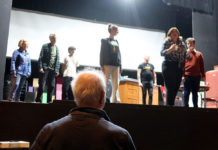I recently had a conversation with Jonah Raskin about how and
why he spent a year working on a Glen Ellen farm for his new book,
“Field Days: A Year of Farming, Eating, and Drinking Wine in
California.” Chair of the Communication Studies Department at
Sonoma State, Jonah’s rationale was simple: “As a youngster, I
spent my summers at my grandfather’s farm on Long Island… but now,
I spend most of my time in offices and classrooms far from the
earth and sunshine… [and] I desperately needed to plant my feet in
the dirt once again, and know first hand, where the food I eat
comes from.”
Having just seen Rob Kenner’s documentary “Food, Inc.,” Jonah’s
motives seem absolutely necessary.
Kenner convincingly presents the argument that not only don’t we
know where our food comes from, we don’t know how it was raised,
harvested, processed, or packaged, and that Big Business (supported
by the U.S. Government), keeps us in the dark on purpose.
The challenge with a documentary of this scope, is to organize
it in such a way that each piece of information builds upon the
previous piece and ends up as a convincing whole. Kenner attempts
this by pre-packaging ten-minute bits of information, each with its
own on-camera face and voice for a particular issue. Barbara
Kowalcyk is the crusading mother who lost her son to the E-coli
bacteria in tainted hamburger meat. Carole Morrison is the poultry
producer who spent hundreds of thousands of dollars to build
factory-like chicken houses, and then lost her contract with Perdue
Farms because she wouldn’t board up the windows that allowed people
to see how the birds were raised. Eduardo Pena is the Union
organizer who shows how the Immigration Service and Big Business
work hand-in-hand by arresting only fifteen illegal immigrant
workers a week at the Smithfield slaughterhouse—so it won’t disrupt
the assembly line.
Most chilling to me was the story about how Monsanto created an
herbicide specific soybean, patented the genetic product, and then
sold it to farmers with the contractual provision that they can’t
collect seed themselves for replanting. Moe Parr is a guy from
Indiana who has traveled from farm to farm for forty years with a
portable seed sorter (a device that separates the seeds from the
chaff so they can be stored for future planting). Claiming that
sorting seeds is aiding and abetting the theft of their patented
product, Monsanto brought a very expensive lawsuit against Parr
that forced him out of business. By the way, did you know Supreme
Court Justice Clarence Thomas, who wrote the decision granting
companies the right to patent genes, used to be an attorney for
Monsanto?
To be fair, Kenner and fellow “foodies” Michael Pollan (“The
Omnivore’s Dilemma”), and Eric Shlosser (“Fast Food Nation”), are
obviously convinced that what is presented is indisputable truth,
but the “bad guys” don’t really get to present their point of view.
(Captions explain that Tyson, Perdue, Monsanto, Smithfield and
several others declined the invitation to be interviewed for this
film). Another criticism is that Kenner clumsily tries to sum up
his documentary with a series of bumper sticker admonitions like:
“Plant a garden,” “Buy locally.”
Far better if Kenner had chosen to end with Joel Slatin’s
organic, hands-on farming operation in the Shenandoah Valley. For
we see that Joel grass feeds his cattle, free ranges his chickens,
and personally knows every hog and every person who works with him.
People travel up to 100 miles to buy bacon, chicken, fresh
vegetables and lean meat that doesn’t need to be laced with ammonia
to kill E-coli.
With Sonoma County’s abundance of farms and farmers markets, we
live where we can know who grows our food, who picked and packed
it, and how it is cooked and served. Your delicious task is to
support and appreciate our local bounty so you too, like Jonah
Raskin, can “know first hand, where the food I eat comes from.”
Comments? E-mail: gi*********@co*****.net.
54.3
F
Healdsburg
March 16, 2025







